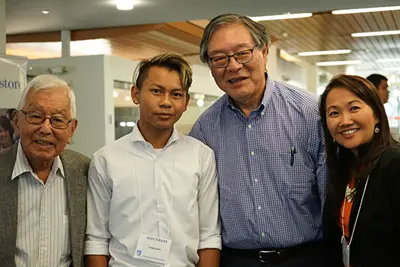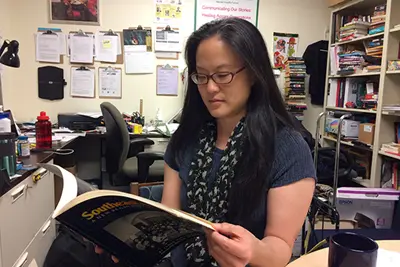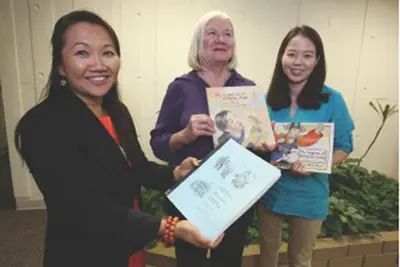UML Launches Southeast Asian Digital Archive
 Image by Higgins & Ross
Image by Higgins & Ross
12/07/2018
By Katharine Webster
For Blong Xiong, the university’s Southeast Asian Digital Archive is a way to share his own history and that of other Hmong who fled the secret war waged by the CIA in Laos.
“This is the history of what happened to us and what we suffered behind the scenes, when nobody saw it,” Xiong said at the formal launch of the archive on Dec. 4. “It’s important to keep it for future generations who come here but don’t know what happened to their parents and their grandparents.”
For Chrisna Khuon ’17, who works as community outreach coordinator for the archive, it’s been an opportunity to learn more about the pasts of her Cambodian mother and Vietnamese father and to place them in a larger historical context.
“My dad is a Vietnamese boat person,” she said. “I asked my dad about how he came to America. I knew generally about Vietnamese history, but I didn’t know his story.”
 Image by Tory Wesnofske
Image by Tory Wesnofske
The archive originated in diverse efforts by community groups, UMass Lowell professors and university librarians to preserve and share the histories of the Cambodian, Vietnamese, Laotian and Hmong refugees who fled the war in Vietnam or the Cambodian genocide. The archive also includes materials from the newer Burmese refugee community.
It all came together when Associate Dean of Fine Arts, Humanities and Social SciencesSue Kim and Assoc. Prof. of EducationPhitsamay Uy, co-directors of the university’s Center for Asian American Studies, obtained a National Endowment for the Humanities grant for $239,000 in spring 2017.
The grant paid for a professional archivist, Mee Xiong, who – with help from students, library staff, a community advisory board and Southeast Asian and refugee organizations – is digitizing and organizing thousands of documents, videos, audio files, newspapers, posters and photos so that they are searchable online and free to the public.
The archive also includes oral histories from Lowell residents and consolidates existing collections from groups including the Angkor Dance Troupe, the Lowell Southeast Asian Water Festival and the Center for Lowell History.
 Image by Tory Wesnofske
Image by Tory Wesnofske
Another $28,000 Creative Economy Fund grant from the UMass president's office is helping to make the archive useful and accessible, especially to students, through lessons, teacher trainings, community workshops and an updated exhibit at the Lowell National Historical Park.
In an emotional speech, Uy talked about the importance of the archive. Uy, who is Lao, once taught elementary school in Long Beach, Calif., which has the largest Cambodian population in the United States. She learned that the University of California at Irvine had a digital archive documenting the community’s history – and she thought Lowell, with the second-largest Cambodian community, should have one, too.
“This has been a labor of love,” she said. “This is the actualization of our community stories. It’s our collective history of being refugees from the killing fields, refugees from the secret war on Laos and refugees from the Vietnam War.”
 Image by Tory Wesnofske
Image by Tory Wesnofske
Chancellor Jacquie Moloney, who served as director of the Indochinese Refugees Foundation for a year in the 1980s, said the experience of scrambling to find housing, food, clothing, school placements, health care and translators for thousands of Southeast Asian refugees was transformational for her and for Lowell.
“How this city responded cemented my love for this city forever, and it changed me forever, because I saw that communities do make a difference. People do make a difference. This city came together, and we built infrastructure, we built systems and we responded in a very holistic, compassionate, wonderful way,” she said.
Provost Michael Vayda, Lowell Mayor William Samaras, City Councilor Vesna Nuon and Angkor Dance Troupe co-founder Tim Thou also spoke. Nuon said he is a child of Cambodia’s killing fields.
“The Khmer Rouge tried to wipe out our culture from existence with their social cleansing by killing scholars, lawyers, doctors, using temples as weapons storage, burning books and turning schools into interrogation chambers,” he said. “It is very important that we have this Southeast Asian Digital Archive to document this for our younger generation. Who are we, really, without our history?”
 Image by Tory Wesnofske
Image by Tory Wesnofske
Khuon said afterward that her father told her more details of his family’s escape from Vietnam. He and his three older brothers fled first with their grandmother because the family feared they would be recruited by the Viet Cong as child soldiers. They were followed later by their parents and younger siblings, she said.
“He told me how they got on the boat, how they failed the first time because of a storm and had to go back to shore. Then the police caught them, and they had to bribe the police to escape again, and then they ended up on Galang Island” in a refugee camp, she said.
Xiong, 65, a member of the archive’s community advisory board, said it’s also important to document how and why so many Southeast Asian refugees came to Lowell, often in a secondary migration from other parts of the U.S.
Xiong first settled in Washington, D.C., but his brother-in-law moved to Lowell and invited him here for a reunion. He never left. “I stayed because there were a lot of Asian people, and at that time in the 1980s, there were a lot of jobs,” he said. “After a time, you form connections with people and you don’t want to leave.
“Now, I feel like I belong to Lowell, and Lowell belongs to me.”




